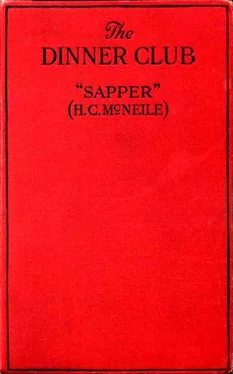The Dinner Club by “Sapper” (H. C. McNeile)
On a certain day in the year of grace 1920, there came into being a special and very select club. There was no entrance fee and no subscription, in which respect it differed from all other clubs. Its membership was limited to six: the Actor, the Barrister, the Doctor, the Ordinary Man, the Soldier, and the Writer. And since each in his own particular trade had achieved what the world calls fame, except the Ordinary Man, who was only ordinary, it was decided that for purposes of convenience they should be entered in the list of members alphabetically according to their trade, and further that they should carry out the only rule of the club in the order of that entry. And the only rule of the club was, that on certain nights, to be mutually agreed on, the member whose turn it was should give to the remaining members an exceedingly good dinner, after which he should tell them a story connected with his own trade, that should be of sufficient interest to keep them awake.
And the only penalty of the club was that if the story was not of sufficient interest to keep the audience awake, the offending member should pay a sum of ten pounds to a deserving charity.
No rule was deemed necessary as to the quality of the dinner: the members had elected themselves with discretion.
CHAPTER I – The Actor’s Story, being The Patch on the Quilt
“The trouble in my game,” he began, “is that the greatest plays can never be staged. There would be no money in them. The public demand a plot—a climax: after that the puppets cease strutting, the curtain rings down. But in life—in real life—there’s no plot. It’s just a series of anti-climaxes strung together like a patchwork quilt, until there comes the greatest anti-climax of all and the quilt is finished.”
He passed his hand through his fast-greying hair, and stared for a moment or two at the fire. The Soldier was filling his pipe; the Writer, his legs stretched in front of him, had his hands thrust deep in his trouser pockets.
“It’s one of the patches in one of the quilts that my story is about,” continued the actor thoughtfully. “Just an episode in the life of a woman—or shall I say, just the life of a woman in an episode?
“You remember that play of mine—‘John Pendlesham’s Wife’?” He turned to the Barrister, who nodded.
“Very well,” he answered. “Molly Travers was your leading lady.”
“I was out of England,” said the Soldier. “Never saw it.”
“It’s immaterial.” The Actor lit a cigarette. “The play itself has nothing to do with my story, except indirectly. But as you didn’t see it, I will just explain this much. I, of course, was John Pendlesham—Molly was my wife, and the third act constituted what, in my opinion, was the finest piece of emotional acting which that consummate actress has ever done in her career.”
The Writer nodded. “I agree. She was superb.”
“Night after night the fall of the curtain found her nearly fainting; night after night there was that breathless moment of utter silence followed by a perfect crash of applause. I am mentioning these old facts because her marvellous performance does concern my story directly—even though the play does not.
“We had been running about a month, I suppose, when my story begins. I had just come off after the third act, and was going to my dressing-room. For some reason, instead of going by the direct door which led into it from the stage, I went outside into the passage. There were some hands moving furniture or something. . . .
“I think you’ve all of you been behind at my theatre. First you come to the swing doors out of the street, inside which the watch dog sits demanding callers’ business. Then there is another door, and beyond that there are three steps down to my room. And it was just as I was opening my door on that night that I happened to look round.
“Standing at the top of the three stairs was a woman who was staring at me. I only saw her for a moment: then the watch dog intervened, and I went into my room. But I had seen her for a moment: I had seen her for long enough to get the look in her eyes.
“We get all sorts and conditions of people behind, as you’d expect—stage-struck girls, actors out of a shop, autograph hunters, beggars. And the watch dog knew my invariable rule: only personal friends and people who had made an appointment by letter were allowed inside the second door. But a rule cannot legislate for every case.
“Gad! you fellows, it’s many years now since that night, but I can still feel, as clearly as if it were yesterday, the message in that girl’s eyes. There had been hope and fear and pitiful entreaty: the look of one who had staked everything on a last desperate throw: the look of a mother who is fighting for her child. It was amazing: I couldn’t understand it. As I stood just inside my door I couldn’t have told you whether she was old or young, plain or pretty. And yet in that one fleeting second this vivid, jumbled message had reached me.” The Actor pressed out his cigarette, and there was silence while he lit another one.
“For a moment I hesitated,” he continued after a while; “then I rang the bell for the watch dog.
“ ‘Who is that lady I saw outside there?’ I asked, as he came in.
“ ‘Won’t give no name, sir,’ he answered. ‘Wants to see you, but I told her the rules.’
“Once again I hesitated; probably I’d exaggerated—put a totally false construction on her expression, probably she was looking for a job like the rest of them. And then I knew that I’d got to see that woman, and that I should have no peace of mind until I’d heard what she had to say. The watch dog was regarding me curiously; plainly he could see no reason whatever for my hesitation. He was a matter-of-fact fellow, was the guardian of the door.
“ ‘Show her in, I’ll see her now.’ I had my back to him, but I could feel his virtuous indignation. After all, rules are rules.
“ ‘Now, sir?’ he echoed.
“ ‘Now; at once.’
“He went out, and I heard him go up the steps.
“ ‘Mr. Trayne will see you. Come this way.’
“And then the door opened again, and I turned to face the woman. She was young—quite young, dressed in a kind of cheap suburban frock. Her shoes had been good ones—once, now—well, however skilfully a patch is put on it is still a patch. Her gloves showed traces of much needle and cotton; the little bag she carried was rubbed and frayed. And over the cheap suburban frock she had on a coat which was worn and threadbare.
“ ‘It was good of you to see me, Mr. Trayne.’
“She was nervous and her voice shook a little, but she faced me quite steadily.
“ ‘It’s a very unusual thing for me to do,’ I said. ‘But I saw you at the top of the stairs, and . . .’
“ ‘I know it’s unusual,’ she interrupted. ‘The man outside there told me your rule. But believe me’—she was talking with more assurance now—‘my reason for coming to see you is very unusual also.’
“I pulled up a chair for her. ‘What is your reason?’ I asked.
“She took a deep breath and began fumbling with her handkerchief.
“ ‘I know you will think me mad,’ she began, ‘but I don’t want to tell you my reason now. I want to wait until after the play is over, and I know you go on at once in the fourth act.’
“ ‘You’ve seen the play, then?’ I remarked.
“ ‘I’ve seen the play,’ was her somewhat astonishing answer, ‘every night since the first.’
“ ‘Every night!’ I stared at her in surprise. ‘But . . .’
“I must have glanced at her clothes or something and she saw what was in my mind.
Читать дальше












